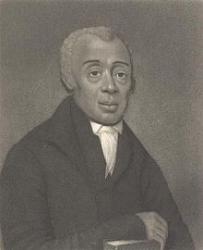- |
User Links
Richard Allen

en.wikipedia.org/wiki/Richard_Allen_(bishop)
| Short Name: | Richard Allen |
| Full Name: | Allen, Richard, 1760-1831 |
| Birth Year: | 1760 |
| Death Year: | 1831 |
Richard Allen was born to a slave in Philadelphia, February 14, 1760. The family was later sold to Stokely Sturgis who lived near Dover, Delaware. Sturgis allowed the family to join the Methodist Society in Philadelphia. Allen taught himself to read and write and began to preach at age 22. Sturgis heard his first sermon "Thou Are Weighed in the Balance and Found Wanting" and came to believe that slavery was morally wrong, so he offered a plan for his slaves to work to buy their freedom. Allen purchased his freedom in 1780.
In 1786, Allen moved back to Philadelphia, which was a center for freed blacks. He was the first ordained person of color in the Methodist Episcopal Church, which had begun dividing over the issue of slavery. He was asked to preach weekly at St. George's Methodist Church, but he also preached three or four sermon every Sunday at other churches in Philadelphia. As the number of black members grew, the white leadership of St. George's began to insist on increased segregation. This led Allen and several others to leave St. George's in 1787. Allen and Absalom Jones (later the first Black Bishop in the Episcopal Church) founded the Free African Society, a non-denominational organization to assist fugitive slaves and free blacks. Allen built the Mother Bethel African Methodist Episcopal Church, which was completed in 1794. This led to court battles between Bethel and St. George's over control of the church. 29 years after the walk out, in 1816, the Philadelphia Supreme Court declared that Allen and his church were free from Methodist Episcopal Church control, and the African Methodist Episcopal Church became a separate denomination.
In 1801, Allen published a hymnal for his congregation A Collection of Spiritual Songs and Hymns" which was the first hymnal published for Blacks.The hymns were published without author attributions or any mention of melodies. Many of the hymns came from Methodist and Baptist sources, but some were written by Allen or members of his congregation. The hymnal is also notable for being the first hymnal to include refrains or choruses freely used with any hymn, rather than attached to specific hymns. This style of hymn was widely used in camp-meeting hymnals, which came a little later, and may have been used in oral traditions, but this was the first time they were published.
Dianne Shapiro, from "And Are We Yet Alive? Conception, Actualization and Vitality of the African Methodist Episcopal Church" by Teresa L. Fry Brown, Ph.D. (https://oimts.files.wordpress.com/2018/11/2018-05-brown.pdf, accessed 11/6/2020) and "Hymnals of the Black Church" by Eileen Southern in The Black Perspective in Music, Vol. 17, No. 1/2 (1989) pp. 153-170
Access an additional article on the Canterbury Dictionary of Hymnology:
| Texts by Richard Allen (2) | As | Authority Languages | Instances |
|---|---|---|---|
| O God, my heart with love inflame | Richard Allen (Author) | English | 2 |
| See, how the nations rage together | Richard Allen (Author) | 2 |


 My Starred Hymns
My Starred Hymns

